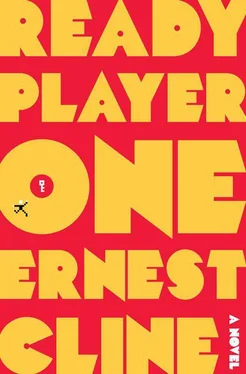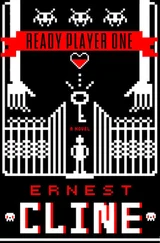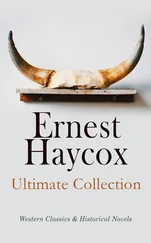Cline Ernest - Ready Player One
Здесь есть возможность читать онлайн «Cline Ernest - Ready Player One» весь текст электронной книги совершенно бесплатно (целиком полную версию без сокращений). В некоторых случаях можно слушать аудио, скачать через торрент в формате fb2 и присутствует краткое содержание. Год выпуска: 2011, ISBN: 2011, Издательство: Crown, Жанр: Старинная литература, на английском языке. Описание произведения, (предисловие) а так же отзывы посетителей доступны на портале библиотеки ЛибКат.
- Название:Ready Player One
- Автор:
- Издательство:Crown
- Жанр:
- Год:2011
- ISBN:9780307887450
- Рейтинг книги:4.67 / 5. Голосов: 3
-
Избранное:Добавить в избранное
- Отзывы:
-
Ваша оценка:
- 100
- 1
- 2
- 3
- 4
- 5
Ready Player One: краткое содержание, описание и аннотация
Предлагаем к чтению аннотацию, описание, краткое содержание или предисловие (зависит от того, что написал сам автор книги «Ready Player One»). Если вы не нашли необходимую информацию о книге — напишите в комментариях, мы постараемся отыскать её.
Ready Player One — читать онлайн бесплатно полную книгу (весь текст) целиком
Ниже представлен текст книги, разбитый по страницам. Система сохранения места последней прочитанной страницы, позволяет с удобством читать онлайн бесплатно книгу «Ready Player One», без необходимости каждый раз заново искать на чём Вы остановились. Поставьте закладку, и сможете в любой момент перейти на страницу, на которой закончили чтение.
Интервал:
Закладка:
I never blamed my mom for the way things were. She was a victim of fate and cruel circumstance, like everyone else. Her generation had it the hardest. She’d been born into a world of plenty, then had to watch it all slowly vanish. More than anything, I remember feeling sorry for her. She was depressed all the time, and taking drugs seemed to be the only thing she truly enjoyed. Of course, they were what eventually killed her. When I was eleven years old, she shot a bad batch of something into her arm and died on our ratty fold-out sofa bed while listening to music on an old mp3 player I’d repaired and given to her the previous Christmas.
That was when I had to move in with my mom’s sister, Alice. Aunt Alice didn’t take me in out of kindness or familial responsibility. She did it to get the extra food vouchers from the government every month. Most of the time, I had to find food on my own. This usually wasn’t a problem, because I had a talent for finding and fixing old computers and busted OASIS consoles, which I sold to pawnshops or traded for food vouchers. I earned enough to keep from going hungry, which was more than a lot of my neighbors could say.
The year after my mom died, I spent a lot of time wallowing in self-pity and despair. I tried to look on the bright side, to remind myself that, orphaned or not, I was still better off than most of the kids in Africa. And Asia. And North America, too. I’d always had a roof over my head and more than enough food to eat. And I had the OASIS. My life wasn’t so bad. At least that’s what I kept telling myself, in a vain attempt to stave off the epic loneliness I now felt.
Then the Hunt for Halliday’s Easter egg began. That was what saved me, I think. Suddenly I’d found something worth doing. A dream worth chasing. For the last five years, the Hunt had given me a goal and purpose. A quest to fulfill. A reason to get up in the morning. Something to look forward to.
The moment I began searching for the egg, the future no longer seemed so bleak.

I was halfway through the fourth episode of my Family Ties mini-marathon when the laundry room door creaked open and my aunt Alice walked in, a malnourished harpy in a housecoat, clutching a basket of dirty clothes. She looked more lucid than usual, which was bad news. She was much easier to deal with when she was high.
She glanced over at me with the usual look of disdain and started to load her clothes into the washer. Then her expression changed and she peeked around the dryer to get a better look at me. Her eyes went wide when she spotted my laptop. I quickly closed it and began to shove it into my backpack, but I knew it was already too late.
“Hand it over, Wade,” she ordered, reaching for the laptop. “I can pawn it to help pay our rent.”
“No!” I shouted, twisting away from her. “Come on, Aunt Alice. I need it for school.”
“What you need is to show some gratitude !” she barked. “Everyone else around here has to pay rent. I’m tired of you leeching off of me!”
“You keep all of my food vouchers. That more than covers my share of the rent.”
“The hell it does!” She tried again to grab the laptop out of my hands, but I refused to let go of it. So she turned and stomped back to her room. I knew what was coming next, so I quickly entered a command on my laptop that locked its keyboard and erased the hard drive.
Aunt Alice returned a few seconds later with her boyfriend, Rick, who was still half-asleep. Rick was perpetually shirtless, because he liked to show off his impressive collection of prison tattoos. Without saying a word, he walked over and raised a fist at me threateningly. I flinched and handed over the laptop. Then he and Aunt Alice walked out, already discussing how much the computer might fetch at a pawnshop.
Losing the laptop wasn’t a big deal. I had two spares stowed in my hideout. But they weren’t nearly as fast, and I would have to reload all of my media onto them from backup drives. A total pain in the ass. But it was my own fault. I knew the risk of bringing anything of value back here.
The dark blue light of dawn was starting to creep in through the laundry room window. I decided it might be a good idea to leave for school a little early today.
I dressed as quickly and quietly as possible, pulling on the worn corduroys, baggy sweater, and oversize coat that comprised my entire winter wardrobe. Then I put on my backpack and climbed up onto the washing machine. After pulling on my gloves, I slid open the frost-covered window. The arctic morning air stung my cheeks as I gazed out over the uneven sea of trailer rooftops.
My aunt’s trailer was the top unit in a “stack” twenty-two mobile homes high, making it a level or two taller than the majority of the stacks immediately surrounding it. The trailers on the bottom level rested on the ground, or on their original concrete foundations, but the units stacked above them were suspended on a reinforced modular scaffold, a haphazard metal latticework that had been constructed piecemeal over the years.
We lived in the Portland Avenue Stacks, a sprawling hive of discolored tin shoeboxes rusting on the shores of I-40, just west of Oklahoma City’s decaying skyscraper core. It was a collection of over five hundred individual stacks, all connected to each other by a makeshift network of recycled pipes, girders, support beams, and footbridges. The spires of a dozen ancient construction cranes (used to do the actual stacking) were positioned around the stacks’ ever-expanding outer perimeter.
The top level or “roof” of the stacks was blanketed with a patchwork array of old solar panels that provided supplemental power to the units below. A bundle of hoses and corrugated tubing snaked up and down the side of each stack, supplying water to each trailer and carrying away sewage (luxuries not available in some of the other stacks scattered around the city). Very little sunlight made it to the bottom level (known as the “floor”). The dark, narrow strips of ground between the stacks were clogged with the skeletons of abandoned cars and trucks, their gas tanks emptied and their exit routes blocked off long ago.
One of our neighbors, Mr. Miller, once explained to me that trailer parks like ours had originally consisted of a few dozen mobile homes arranged in neat rows on the ground. But after the oil crash and the onset of the energy crisis, large cities had been flooded with refugees from surrounding suburban and rural areas, resulting in a massive urban housing shortage. Real estate within walking distance of a big city became far too valuable to waste on a flat plane of mobile homes, so someone had cooked up the brilliant idea of, as Mr. Miller put it, “stacking the sumbitches,” to maximize the use of ground space. The idea caught on in a big way, and trailer parks across the country had quickly evolved into “stacks” like this one—strange hybrids of shantytowns, squatter settlements, and refugee camps. They were now scattered around the outskirts of most major cities, each one overflowing with uprooted rednecks like my parents, who—desperate for work, food, electricity, and reliable OASIS access—had fled their dying small towns and had used the last of their gasoline (or their beasts of burden) to haul their families, RVs, and trailer homes to the nearest metropolis.
Every stack in our park stood at least fifteen mobile homes high (with the occasional RV, shipping container, Airstream trailer, or VW microbus mixed in for variety). In recent years, many of the stacks had grown to a height of twenty units or more. This made a lot of people nervous. Stack collapses weren’t that uncommon, and if the scaffold supports buckled at the wrong angle, the domino effect could bring down four or five of the neighboring stacks too.
Читать дальшеИнтервал:
Закладка:
Похожие книги на «Ready Player One»
Представляем Вашему вниманию похожие книги на «Ready Player One» списком для выбора. Мы отобрали схожую по названию и смыслу литературу в надежде предоставить читателям больше вариантов отыскать новые, интересные, ещё непрочитанные произведения.
Обсуждение, отзывы о книге «Ready Player One» и просто собственные мнения читателей. Оставьте ваши комментарии, напишите, что Вы думаете о произведении, его смысле или главных героях. Укажите что конкретно понравилось, а что нет, и почему Вы так считаете.




![Эрнест Клайн - Ready Player Two [calibre]](/books/438636/ernest-klajn-ready-player-two-calibre-thumb.webp)







